Ghana makes progress in attaining SDGs

Ghana is making steady progress in her monitoring of the Sustainable Development Goals (SDGs) as her 2022 Voluntary National Review (VNR) report showed improvement in most of the SDGs’ indicators.
The country has also made progress on increasing the number of SDGs indicators she reported on some two years ago, which stood at 66 compared to this year’s figure of 102.
The Ghana 2022 VNR report, which focused on the progress of implementation of the SDGs, rapid assessment, and high-level political forum thematic areas, was presented at a two-day stakeholders’ forum, which ended in Tamale on Tuesday.
The forum was to share the main highlights of the 2022 Ghana VNR report to showcase the efforts the country was making toward achieving the SDGs, and the challenges and opportunities for which partnerships could be strengthened to accelerate the achievement of the 2030 Agenda.
It was attended by representatives from Metropolitan, Municipal and District Assemblies, youth and children’s groups, women groups, farmer associations, persons with disabilities, civil society organisations, non-governmental organisations, the private sector and the media.
The 2022 Ghana VNR report showed that under the no hunger indicator, which focused on the prevalence of moderate or severe food insecurity in the population based on the food insecurity experience scale, Ghana made some remarkable improvements, there had been a decrease in food insecurity from 49.5 per cent in 2017 to 47.7 per cent in 2020.
Under the indicator on health, which focused on good health and wellbeing, the maternal mortality ratio had declined from 580 in 2007 to 301 per 100,000 live births in 2021, whilst the under-five mortality rate had also declined from 55 to 45 per 1000 live births from 2019 to 2021.
On the proportion of the population using safely managed drinking water services, the 2022 Ghana VNR report showed that the country made significant progress as 92 per cent of households had access to improved sources of water, in 2021 compared to 44.3 per cent in 2017 with access to higher in urban areas than in rural areas.
Mr Vitus Bobrnuo, a Senior Statistician, Ghana Statistical Service, who presented the report during the forum, called for innovative ways of funding the SDGs and broadening partnerships around them for more progress.
He also called for more innovative ways of generating data to ensure the availability of properly disaggregated data on all indicators, especially persons with disabilities.
Alhaji Shani Alhassan Saibu, Northern Regional Minister, who was represented during the forum, commended stakeholders for the enthusiasm shown during the forum and reminded the various stakeholder of their roles in achieving the SDGs.
He further urged them to harness their activities for improved data gathering on the SDGs.
Dr Suleman Abudulai, the Northern Regional Commissioner of the National Development Planning Commission, said, “Our President’s role as a co-chair of the UN Secretary General’s SDG Advocates Emeritus Group places a responsibility on all stakeholders in the country to do their very best in implementing the goals.”
He said “Together with our President, we must be the go-to best practice in the world on the goals. This will make our VNR report valuable to our peer learners.”
He called for strengthened collaboration amongst “The Regional Coordinating Council, Assemblies and all development stakeholders at the regional, district and community levels. This way, we can deliver the development we all dream for our people.”
Some of the stakeholders lauded the efforts being made in attaining the SDGs, and called for deeper collaboration, especially in the area of data gathering to help properly target specific populations with appropriate interventions.
Source: GNA
